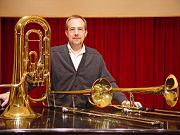 MW: In your opinion how has technology, especially the
internet, changed the landscape of music education in recent years and where do
you see it headed in the future?
MW: In your opinion how has technology, especially the
internet, changed the landscape of music education in recent years and where do
you see it headed in the future?
JM: I can’t speak to where it’s going from here, but the
internet certainly has provided easy (and in many cases free) access to a lot of material helpful to both student and
teacher. I direct my students to specific websites to download free articles,
technical exercises, lessons, and playing tips – and it’s all available in
minutes. A motivated student can learn much on his/her own now that was not
possible even 15 years ago.
With regard to other technologies such as Smart Music or Band in a Box, I am torn. While these tools are a help in learning specific pieces, they are no substitute for careful score study or playing with real people. Working live with other musicians is what music is all about. Communication, flexibility, artistry, sensitivity, listening and focus are all vibrantly alive when you’re playing with someone else. With a machine, much of this can be lost or ignored.
Â
MW: You are such an experienced and accomplished performer
as well as an educator. How has your
teaching experience influenced your performing and vice-versa?
JM: There is no question that my experience as a performer has greatly enhanced my teaching abilities. Knowledge of styles, performance skills, discipline, listening skills – not to mention people skills, how to deal with nerves, and the like are just a few of the things a performer learns over time. I use what I have learned in every lesson.
Teaching is a good catalyst for thinking about one’s own
playing. Some issues I help students with cause me to think critically (constructive criticism, that is!) about
aspects of my own playing I need to work on. But personally, I have to be
careful not to let analysis slip into performance. For me, this has the
potential of complicating and making more difficult the act (art) of playing
music. Analysis is for the practice room. Freedom and artistry are for
performance.
MW: What advice do you have for people who are just starting to teach trombone?
JM: The advice I would give is to remember that no two
students are alike. Each is an individual, with his or her own strengths and
weaknesses. Adopting one way of teaching – one set of exercises, one proper
physical “set upâ€, one type of instrument that is the best, etc. – seems
foolish and to me, it cheats the student. Take each student separately, and
teach them what works best for them. There are certain absolutes, of course,
without which a student cannot succeed: discipline, curiosity, hard work, and
listening are just a few. But be flexible in your presentation of ideas, and be
open-minded in your options. Tailor them
to suit the individual.
MW: What advice do you have for students when they are looking for a private trombone teacher?
JM: For the serious student: if possible, find a teacher who
is now, or has been, an active performer. Someone involved in performing will
likely have more insight into playing problems, and a clear perspective on the
importance of practice, discipline, and artistry.
MW: Thanks for chatting with us today.
JM: My pleasure.
